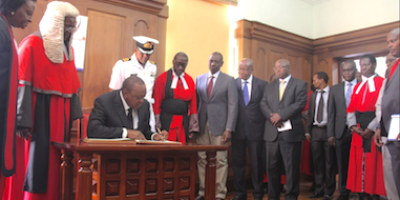
A report outlining major milestones achieved by the judiciary as a result of initiatives and reforms was released in Kenya.
With the shared belief that they should be “robustly Independent, but constructively interdependent”, the three arms of the Government of Kenya gathered in February 2019 for the launching ceremony of the 2017-2018 State of the Judiciary and Administration of Justice Annual Report (SOJAR). The SOJAR report is meant to promote accountability of the judiciary and coordinate actions among the three branches of government. With high-level guests present, the ceremony provided an important opportunity to assess progress made, identify existing challenges and plan the way forward.
Since the adoption of the 2010 Constitution, the judiciary has undergone significant reforms. The SOJAR report presents the results achieved, many of which were made possible through IDLO’s work on enhancing access to justice, especially for women and marginalized groups, and promoting the rule of law.
Notable progress was made in reducing case backlog. In January 2017, there were 170,186 cases older than five years still pending in front of the judiciary. At the end of 2018, this number was brought down to 102,773 – representing a decrease of 39.6 per cent. IDLO promoted the reduction of backlog through the support provided to the Court Annexed Mediation process, an Alternative Dispute Resolution (ADR) mechanism aimed at removing some of the burden currently put on the courts.
This area of IDLO intervention had a direct impact on the level of private sector confidence in Kenya’s justice system. In just one year, between 2017 and 2018, Kenya moved up the ranks from 80 to 61 in the World Bank’s Ease of Doing Business Report. One of the key performance indicators of the report is the time taken during trial to hear and determine a matter. Through Court Annexed Mediation, the average time for the process to be initiated and a settlement agreement signed in the was recorded as 63 days, down from the initial 356 days, representing an 82 per cent reduction.
IDLO’s engagement and support towards ICT transformation within the judiciary was also cited in the SOJAR report. To further strengthen efficiency and enhance access to justice, IDLO supported the digitalization of court files, court proceedings and the automation of registries, which was then implemented in the Commercial and Family Division of the High Court. These efforts also included electronic filing of cases (e-filing), automated fee assessment, e-payments and e-services. The automation of the registries within the Family Division contributed to improved results, which saw 51 per cent of completed cases – the highest percentage within the judiciary.
Furthermore, the judiciary has made great strides in the Electoral Dispute Resolution (EDR) process. Prior to Kenya's 2017 general elections, IDLO supported the Judiciary Committees on Elections (JCE) and the Political Party Dispute Tribunal (PPDT) through several interconnected initiatives, including technical support in the development of rules and procedures, research and publication on EDR-related issues, and capacity building of judicial officers. Notably, the JCE and PPDT now resolve electoral disputes within the timeline set in the Constitution.
While these results are significant, there is still room for improvement. The President of Kenya, H.E. Uhuru Kenyatta, emphasized during the SOJAR report launch that the Constitution is still in its infancy and its full implementation requires a concerted effort from all actors involved. In this regard, the judiciary and IDLO will continue to strengthen ongoing ICT transformation, work to further reduce case backlog, and promote stronger synergies between the arms of government as well as development partners.

